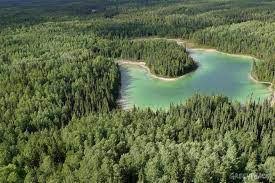Colin Lachance was born in Massey on the North Shore of Lake Huron. He earned an undergraduate degree in Geography from Carleton University and a Masters degree in Environmental Studies from York University.
A self-described reconciliation and transformative change facilitator, Colin has worked with Indigenous communities and municipalities in Northern Ontario on forest management reform. He has also worked with the Forest Stewardship Council of Canada on the development of community forestry best practices, and with the Nishnawbe Aski Nation on forest tenure reform.
In this video, Colin talks about his experience working on forest management reform in the Chapleau and Superior East regions of Northern Ontario. In the Chapleau area, Colin spent 10 years trying to persuade Indigenous communities and neighbouring municipalities to accept an alternate model of forest management to address social equity, biodiversity and sustainable community development. While there were some positive results from the exercise in Chapleau, Colin admits they were far from transformative.
Racism, mistrust and resistance to change played a part, but Colin also reflects on his own role as a facilitator and the lessons he learned about inspiring people to embrace change.
To get people to overcome their fear of change, you need “a sparkplug, a champion,” he tells us. As a facilitator, you need passion and emotion to convince people that change is good, but you also run the risk of losing emotional objectivity, overselling your passion, and becoming overly attached to your desired outcome.
The much more successful forest management reform initiative in Superior East gave four First Nation communities a voice in planning, access to employment and business opportunities as well as a trust fund that could be used for training, environmental compliance studies and other initiatives related to forest management.
According to Colin, the sacred relationship with the land that is central to Indigenous culture needs to be embraced more than ever as we confront climate change, deforestation and the depletion of our oceans.
